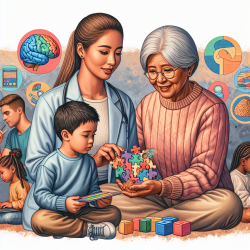Introduction
In the demanding world of caregiving, particularly for those tending to family members with dementia, the challenges are multifaceted. Caregivers often find themselves overwhelmed by the emotional and physical demands of their roles. However, recent research has shed light on two critical attributes that can enhance a caregiver's ability to cope: resilience and emotional intelligence. This blog delves into how these qualities can be harnessed to improve occupational performance and overall well-being.
The Power of Resilience and Emotional Intelligence
The study titled "Resilience, Emotional Intelligence, and Occupational Performance in Family Members Who Are the Caretakers of Patients with Dementia in Spain: A Cross-Sectional, Analytical, and Descriptive Study" highlights the significant impact of resilience and emotional intelligence on caregivers' occupational performance. Conducted in Spain, this research analyzed 144 primary family caregivers of dementia patients, revealing key insights into how these traits influence caregiving effectiveness.
Key Findings
- Resilience: Caregivers with higher resilience levels dedicated more time to self-care and leisure activities, especially during the moderate phase of dementia. This was linked to better management of stress and improved coping strategies.
- Emotional Intelligence: Higher emotional intelligence was associated with increased time for self-care and leisure, particularly in the moderate and severe phases of dementia. Emotional intelligence helps caregivers manage their emotions effectively, reducing stress and improving their ability to care for their loved ones.
Practical Implications for Practitioners
For practitioners working with caregivers, these findings underscore the importance of fostering resilience and emotional intelligence. Here are some strategies to consider:
- Training Programs: Develop workshops or training sessions focused on building emotional intelligence and resilience. These can include techniques for emotional regulation, stress management, and adaptive coping strategies.
- Support Groups: Encourage caregivers to join support groups where they can share experiences and learn from others. These groups can provide emotional support and practical advice, enhancing resilience.
- Self-Care Promotion: Emphasize the importance of self-care routines for caregivers. This can include regular exercise, mindfulness practices, and hobbies that provide relaxation and joy.
Encouraging Further Research
While this study provides valuable insights, it also opens avenues for further research. Understanding the nuanced relationship between emotional intelligence, resilience, and caregiving can lead to more targeted interventions. Practitioners are encouraged to explore these areas in greater depth, potentially collaborating with researchers to develop innovative solutions that enhance caregiver well-being.
Conclusion
The intersection of resilience and emotional intelligence presents a promising pathway for improving the lives of caregivers and the quality of care they provide. By embracing these attributes, caregivers can better navigate the complexities of their roles, ultimately benefiting both themselves and their loved ones.
To read the original research paper, please follow this link: Resilience, Emotional Intelligence, and Occupational Performance in Family Members Who Are the Caretakers of Patients with Dementia in Spain: A Cross-Sectional, Analytical, and Descriptive Study.










